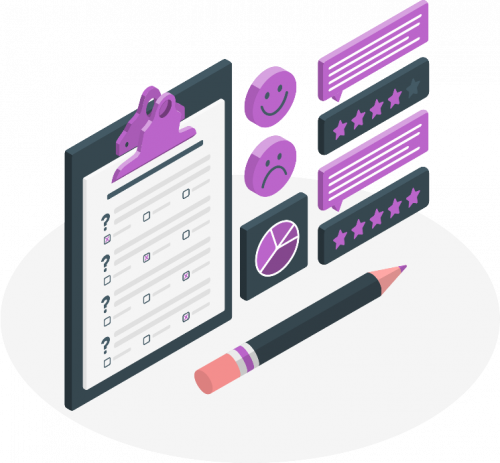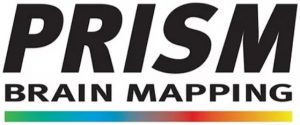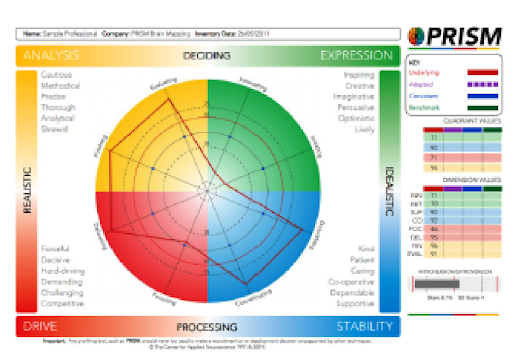
Gameplan works with global industry leaders to bring our clients the best-in-class assessments that cater to various needs of organisations. These assessments are scientifically validated measurement and analytical tools that provide valuable insights and can lead to significant progress when acted upon.
Gameplan’s consultants are trained and accredited to administer the assessments and interpret the results of all of the tools we currently offer. These include:
- PRISM Neuroscience based Brain Mapping
- Psychometric assessment tools
- Aptitude tests
- Personality surveys
- Motivation surveys
- Emotional Intelligence Assessments
- 360-degree feedback surveys
- Employee Engagement Surveys

PRISM is a revolutionary way of identifying people’s behaviour preferences. PRISM approaches human behaviour from the perspective of Neuroscience. This exciting online tool takes advantage of some of the most up-to-date neuroscience discoveries to provide users and organizations with a series of ‘maps’ which are visual representations of how they prefer to respond to the world around them.
PRISM can be used in the many areas as can be seen here.
Uses the power of neuroscience to enhance leadership performance:
Develop understanding of behaviours, motivations and individual beliefs
Manage emotions, feelings and behaviours
Replace limiting beliefs with enabling ones
Be more responsive, more adaptable and more innovative
Create holistic strategies and build a team committed to achieve them
Motivate each team member to reach their potential.
Achieve a cohesive, focused and highly productive team in a volatile and ever changing environment.
Create a shared winning vision with tangible outcomes
Maintain open communication and positive relationships with each other
Identify and solve problems using the PRISM Cycle of Performance Excellence
Have clearly defined roles and work procedures
Cooperate cross-functionally
PRISM Talent Finder is an easy-to-use online system that analyses and benchmarks star performers within each role in an organisation. By using this process, via the organisation’s own dashboard, recruiters can create accurate job benchmarks of those characteristics that have a proven track record of achieving top performance in each role. The system can then instantly pre-screen candidates to identify those who most closely match the characteristics of the star performers without any manual intervention from recruiters
To influence buying decisions, successful salespeople need to be able to activate the appropriate areas of the customer’s brain – some customers use more emotion than rational analysis when making buying decisions. For others, the reverse is true. When faced with a buying choice, a customer’s subconscious will encourage them to choose you rather than your competitors. This sales approach is known as ‘Neuroselling’.
PRISM 360° can be customized according to your specific business requirements and enables up to 26 observers’ responses to be recorded, including those of the candidate and the line manager. The system offers a selection of generic competencies, but users can also upload their own, in-house competencies onto the system.

PROFESSIONAL
PERSONAL
FOUNDATION
360 FEEDBACK
TEAM MAPS
TEAM DIAGNOSTICS
TALENT FINDER
BENCHMARKING
CAREER MATCH

PSYCHOMETRIC ASSESSMENT TOOLS
Psychometrics are sophisticated tools designed to measure individual differences in a number of areas such as intelligence, ability, personality, emotional intelligence and motivation. When used in combination with other information sources they provide a powerful insight into why people make the decisions they make and why they behave in the way they do. Psychometrics also help predict a person’s future behaviour and performance and therefore are an instrumental tool in business planning.
They are used for a number of purposes including:
recruitment and selection
personal, team and leadership development
career coaching and management
We offer 3 different types of psychometric measurements:
Ability or intellectual capability: This type of test measures an individual’s intellectual horsepower and is most commonly used in recruitment and selection. There are three types of ability tests –verbal reasoning, numerical reasoning and logical reasoning.
Personality: These measure an individual’s character traits. These traits are the things that enable us to empathise with others or predict how they might behave in certain circumstances. Understanding someone’s personality helps to understand how he/she works, what type of work they will excel in, how they will associate with their peers and manage their team. Personality assessments are an essential part of recruitment evaluations for supervisory and managerial positions.
Motivation: Motivation tools provide information about the type of environment, tasks and activities that motivate an individual. Thus, assessing motivation makes matching individuals to roles that will not clash with their work attitudes, and that will meet their work style preferences, possible.
APTITUDE TESTS
A full range of tests to measure critical thinking, reasoning & situational judgement. Aptitude tests can provide answers to how the person could react when under pressure or the extent to which they could respond effectively in an emergency. These tests are aimed at senior managers and leadership groups. Aptitude test include:
Watson Glaser Critical thinking appraisal: This assesses an individual’s capability for critical thinking – a discrete skill distinct from, but not independent of, overall intelligence. Critical thinking is the ability to recognise that a problem exists and to look for evidence to solve it.
Numerical Reasoning Appraisal: This is designed to measure an individual’s ability to interpret and correctly utilise numerical information in a variety of ways.
Differential Abilities Test (DAT): This Test considers two types of reasoning to support the assessment of potential – whether this is for personal development, further education or a new job role. It includes measures of verbal and numerical reasoning and is highly regarded as a measure for assessing aptitude and ability across the general population ability range.
Situational Judgement Tests (SJT): Measure the way an individual is likely to react to certain situations. Candidates are asked to rate the appropriateness of possible responses in relevant work-based scenarios. Specialised tests for customer service, call centres and administrative staff are also available.
PERSONALITY SURVEYS
Personality surveys open up a window to how the individual thinks, acts, processes information and how they view the world. These powerful surveys are a great tool towards identifying and strengthening one’s gifts as well as to address the gaps.
Personality surveys are used across mid and senior level roles extensively around the world as a way of determining the influences and work preferences as well as judge future potential.
Some of the surveys Gameplan can offer include:
The Intrinsic Motivation test is a powerful measure to help understand the internal motivators and drivers of an individual. It identifies an individual’s ideal role from a motivational standpoint, it can be used to determine whether a specific role will give them that ‘buzz’ to work well.
Intrinsic offers you an understanding as to how an individual will convert competency into performance: that is, what motivates them to actually ‘do’ something rather than simply have the capability to do something which ability tests assess. It does not measure ‘extrinsic’ motivation – drivers such as salary or bonuses as these can be assessed during an interview.
The Emotional Intelligence helps assess and develop individuals’ levels of emotional intelligence across 7 key domains: Self-awareness, Emotional Resilience, Motivation, Interpersonal Sensitivity, Influence, Intuitiveness and Conscientious. It gives the key to data that has the ability to predict their possible future performance in role.
Engagement surveys enable an organisation to measure the extent to which its employees are engaged: engaged employees are loyal and productive. The key to improving engagement is to accurately predict the drivers and then take action.
One of the key outputs from the employee engagement survey is the Engagement Score calculated by considering advocacy, loyalty and satisfaction: this score can be used as a benchmark for future surveys or across the industry. Included within the report is the valuable Key Driver Analysis report – which highlights the key areas that, with some consideration and investment, are likely to provide the greatest return in the form of an increase in the Engagement Score.
360-DEGREE FEEDBACK SURVEYS
360 Degree Feedback surveys are used to help organisations review the effectiveness of their leaders and managers, and to provide them with insightful developmental feedback. They are also used to assess employees against important strategic company objectives and values such as; Health and Safety commitment, Managerial and Leadership styles or Working Practices and get access to the bigger picture.
A well run 360 Degree Feedback survey can produce enormous benefits, both for the individuals taking part and for the company which employs them. The major benefits of a 360 Degree Feedback survey, compared with other forms of assessment and appraisal, are very clear:
It can be clearly linked to the competencies, behaviours and values required for a job
It provides qualitative as well as quantitative feedback, such as comparative data on a departmental basis
It provides a sound basis for development planning
It involves people with different perspectives, in different roles, and at different levels
It generates commitment to development
The process is seen to be much fairer and transparent if handled properly
It can help start or maintain a process of cultural change
- Leadership 360: Designed for use with those operating at a strategic level. Using a five-point scale, the respondent is asked to rate their response to 66 question items and provide verbatim comments in response to two items.
- Manager 360: Designed for use with those with line management responsibility but who do not operate at a strategic level. Using a five-point scale, the respondent is asked to rate their response to 44 question items and provide verbatim comments in response to two items.
- Individual Contributor 360: Designed for use with those with no line management responsibility. Using a six-point scale, the respondent is asked to rate their response to 55 question items and provide verbatim comments in response to two items.
- 180 degree feedback: Designed for an individual to gain detailed feedback on a particular area of their work. This is most commonly a line manager and their direct reports. Using a five-point scale, the respondent is asked to rate their response to a series of question items and provide verbatim comments in response to two items.
- Sales Leader 360: Adapted specifically for use with sales managers who lead teams in a fast-paced sales environment. Using a five-point scale, the respondent is asked to rate their response to a number of items and provide verbatim comments in response to two items.
- Sales Professional 360: Designed for sales professional working in a fast-paced sales environment. Using a five-point scale, the respondent is asked to rate their response to a number of items and provide verbatim comments in response to two items.
- Emotional Intelligence 360: The survey collects information based across the 7 key domains of Emotional Intelligence; Self-awareness, Emotional Resilience, Motivation, Interpersonal Sensitivity, Influence, Intuitiveness and Conscientious. Using a five-point scale, the respondent is asked to rate their responses across 69 statements for Managerial 360, or 84 statements for the General level 360.
